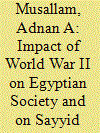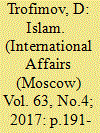| Srl | Item |
| 1 |
ID:
174244


|
|
|
| 2 |
ID:
155361


|
|
|
|
|
| Summary/Abstract |
THE WAVES OF DESTABILIZATION in the Middle East that have risen high in recent years, terrorist acts that follow one another, persecution of those who think differently or follow different religions in the Muslim countries and even outside them bring to mind, once more, Prof. Huntington. Indeed, can Islam and violence, Islam and democracy and, in the final analysis, Islamic and non-Islamic values cohabitate within the frames of the steadily globalizing community of men?
|
|
|
|
|
|
|
|
|
|
|
|
|
|
|
|
| 3 |
ID:
182898


|
|
|
|
|
| Summary/Abstract |
The establishment of the State of Israel symbolised the beginning of a new era in the relationship between Muslims and Jews and sparked a religious conflict that has continued to date. This article examines the main precepts underlying the rejection of the idea of Jewish statehood/nationhood by the Muslim Brotherhood, perhaps the largest and most influential Islamist movement in the post-World War I era.
|
|
|
|
|
|
|
|
|
|
|
|
|
|
|
|
| 4 |
ID:
161456


|
|
|
| 5 |
ID:
099297


|
|
|
|
|
| Publication |
2010.
|
| Summary/Abstract |
This article presents an interpretation of Sayyid Qutb's political theory based on a prominent feature of his thought: the claim that Islamic law and human nature (fitra) are in perfect harmony, and that the demands of Islamic law are easy and painless for ordinary human moral capacities. I argue that Qutb is not only defending Islamic law as true and obligatory, but also as a coherent "realistic utopia"-a normative theory that also contains a psychological account of that theory's feasibility. Qutb's well-known fascination with the earliest generation of Muslims (the salaf) is an integral part of this account that serves two functions: (1) as a model of the feasibility and realism of an ideal Islamic political order, and (2) as a genealogy of the political origins of moral vice in society. Qutb's project is thus an account of exactly why and how Islam requires politics, and how modern humans can be both free and governed.
|
|
|
|
|
|
|
|
|
|
|
|
|
|
|
|
| 6 |
ID:
115333


|
|
|
|
|
| Publication |
2012.
|
| Summary/Abstract |
Tyrannicide, that is, assassinating one's own leader in order to take over the government and/or to dramatically influence policy, carries multiple difficulties and mortal perils for the people involved. One of them has to do with a latent danger which may only come into view after a successful assassination, followed by a takeover of the government by the assassin or people ideologically close to him; the new elites, after overthrowing the old ones, may be exposed to the same fate of violent removal. This may open a Pandora's Box of murders and counter-murders that tyrannicide perpetrators will undoubtedly wish to avoid. Given this fact, some assassins (and/or their ideological cohorts) invested a lot of time and effort to rigorously explain why this specific leader, and no other, could and should be killed. Why their assassination is unique and justified, while similar behaviour by others is not. Hence, the ideological structures behind tyrannicide are not only intended to justify it in the simple sense of the word, but also to prevent it from repeating itself endlessly. These elaborate ideological structures, and, more specifically, the form they took in the thought of two Egyptian radical Islamic writers, Sayyid Qutb and Abd al-Salam Faraj, are the locus of our discussion in the present paper.
|
|
|
|
|
|
|
|
|
|
|
|
|
|
|
|
| 7 |
ID:
181950


|
|
|